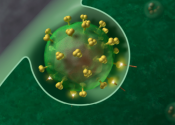Male circumcision is the removal of some or all of the foreskin (prepuce) from the penis. The word "circumcision" comes from Latin circum (meaning "around") and cædere (meaning "to cut").
Early depictions of circumcision are found in cave drawings and Ancient Egyptian tombs, though some pictures are open to interpretation. Religious male circumcision is considered a commandment from God in Judaism. In Islam, though not discussed in the Qur'an, circumcision is widely practiced and most often considered to be a sunnah. It is also customary in some Christian churches in Africa, including some Oriental Orthodox Churches. According to the World Health Organization (WHO), global estimates suggest that 30% of males are circumcised, of whom 68% are Muslim. The prevalence of circumcision varies mostly with religious affiliation, and sometimes culture. Most circumcisions are performed during adolescence for cultural or religious reasons.
There is controversy regarding circumcision. Advocates of circumcision argue, for example, that it provides important health advantages which outweigh the risks, has no substantial effects on sexual function, has a low complication rate when carried out by an experienced physician, and is best performed during the neonatal period. Opponents of circumcision argue, for example, that it interferes with normal sexual function, is performed due to excuses and myths believed or conjured by parents and health providers, is extremely painful, and when performed on infants and children violates the individual's human rights.
The American Medical Association stated in 1999: "Virtually all current policy statements from specialty societies and medical organizations do not recommend routine neonatal circumcision, and support the provision of accurate and unbiased information to parents to inform their choice."
The World Health Organization (WHO; 2007), the Joint United Nations Programme on HIV/AIDS (UNAIDS; 2007), and the Centers for Disease Control and Prevention (CDC; 2008) state that evidence indicates male circumcision significantly reduces the risk of HIV acquisition by men during penile-vaginal sex, but also state that circumcision only provides minimal protection and should not replace other interventions to prevent transmission of HIV.








